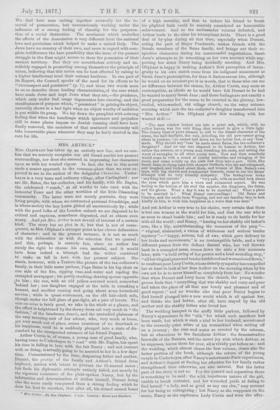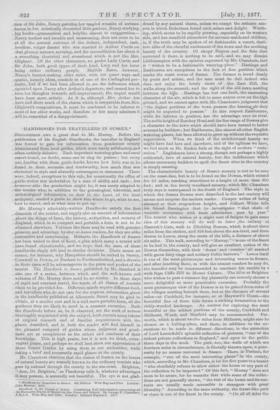MRS. ARTHUR.*
Mae. OLIPHANT has taken up an entirely new line, and we con- fess that we scarcely recognise our old friend amidst her present surroundings, nor does she succeed in impressing her characters upon us with her wonted vigour. In fact, she has in this novel made a nearer approach to the common-place than we ever ex- pected to see in the author of the delightful Chronicles. Under- hayes is a very tame and ordinary village, after Carhngford ; nor are Mr. Bates, the tax-collector, and his family, with Mr. Eagles, the celebrated "coach," at all worthy to take rank with the immortal Tozer and the other worthies of the little Dissenting community. The latter were not merely portraits, they were living people, with whom we contracted personal friendships, and in whose society the lazy hours glided all unconsciously by ; while with the good folks of the London suburb we are disposed to be critical and captious, sometimes disgusted, and at others even weary. And yet Mrs. Arthur is not devoid of interest of a certain kind. The story has no plot in it, but that is not of conse- quence, as Mrs. Oliphant's stronger point is her clever delineation of character ; and in the present instance, it is not so much with the delineation as with the selection that we quarrel ; and this, perhaps, is scarcely fair, since an author has surely the right to choose his own material, and it would have been indeed a triumph had the writer contrived to make us fall in love with her present subject. She starts, however, with a Teniers-liko picture of the tax-collector's family, in their little mean parlour, Papa Bates in his big chair on one side of the fire, sipping ruin-and-water and reading the crumpled newspaper ; his portly stocking-darning spouse opposite to him ; the son, with an old yellow-covered novel, somewhat behind her ; one daughter engaged at the table in remaking a bonnet, and another coming and going about some household service ; while in quasi-retirement, on the old hair-cloth sofa, though under the full glare of gas-light, sit a pair of lovers. The mise- en-scene is fairly good, we take in the whole at a glance, and the effect is heightened by the showy dress cut very much in "the fashion," of the handsome fianecre, and the unstudied plainness of the easy morning suit of her adorer, who, very much at home, yet very much out of place, seems conscious of no drawback to his happiness, until he is suddenly plunged into a state of dis- comfort by the unexpected entrance of his friend Durant. Arthur Curtis is, of course, a young man of good family, who, having come to Underhayes to "read" with Mr. Eagles, has spent his time in falling in love with the fair Nancy ; and not content with so doing, is actually going to be married to her in a few days' time. Commissioned by the irate, despairing father and mother, Durant, the prete'ye: of the family and Arthur's friend from boyhood, arrives with intent to prevent the ill-starred union ; but finds his diplomatic attempts entirely foiled, not merely by the vigorous resistance of the plain-spoken Nancy, but by the infatuation and determination of Arthur himself, Durant being also the more easily conquered from a strong feeling which he does lus best to smother, that after all, his errand cannot boast
Mn. Arthur. By Mrs. Oliphant. 8 vole. London : Huret and Blaokott
of a high morality, and that to induce his friend to break his plighted faith could be scarcely considered an honourable achievement. And so the ambassador returns defeated, and Arthur leads to the altar his triumphant bride, There is a good deal of by-play during all this time, especially when Durant, acting the part of Major Pendennis, makes friends with the female members of the Bates family, and brings out their re- spective characters during his unsuccessful negotiations, Sarah Jane's attempts to do something on her own account while sup- porting her sister Nancy being decidedly amusing. And Mrs. Oliphant is happy in making Arthur's first perception of incon- gruity in his own match come from his indignant amazement at Sarah Jane's presumption, for then it flashes across him, although he would on no account put it in words, that to those who can see no difference between the sisters, he, Arthur Curtis, may seem as contemptible, as idiotic as he would have felt Durant to be had he wanted to marry Sarah Jane ; and these feelings are not exactly a good preparation for the scene to be enacted in the gloomy, low- roofed, whitewashed, old village church, on the rainy autumn morning which sees the tax-collector's daughter transformed into "Mrs. Arthur." Mrs. Oliphant gives this wedding with her wonted skill :—
"The east window looked out into a great oak, which, with its yellow leaves, was the only thing that seemed to give a little light
The dreary lines of pews seemed to add to the dismal character of the scene, the half-daylight, the rain drizzling, the old pew-opener going about in pattens,—no carpet laid down for the bridal feet, or any 'fuse'
made. Why should any fuss' be made about Bates, the tax-colleotor's daughter? And no one was disposed to do honour to Arthur, but
rather the reverse, as a young man forsaking his caste, and setting the worst of examples to all other young men. Now and then somebody would come in with a sound of closing umbrellas and swinging of the doors, and come noisily up the aisle and drop into a pew. Girls, like
Sarah Jane, in cheap hats with oheaper feathers, who sat and whispered, and laughed, and looked about them, and women of Mrs. Bates's own
type, with big shawls and nondescript bonnets, came to see the Bates' triumph with no very friendly sympathy. The bridegroom looks ' anything but ecstatic' 'very pale, with an excited look about
the eyes which gave him a worn and exhausted aspect. He was feeling to the bottom of his soul the squalor, the dinginess, the damp, and the gloom. What a day it was to be married on 1 That a place to be married in 1 What dismal surroundings 1 Old Bates and Charley, and the uncle from Wapping, and not one familiar face to look kindly at him, to wish him happiness in a voice that was dear.'"
And yet Arthur is very true to his choice, very certain that there is but one woman in the world for him, and that the one who is so soon to stand beside him ; and he is ready to do battle for her with all the world ; and Nancy, "leaning on her shabby old father's arm, like a lily, notwithstanding the meanness of the prop "— " virginal, abstracted, a vision of whiteness and serious tender mystery "—" happy, serious, full of awe, which gave delicacy to her looks and movements," is no contemptible bride, and a very different person from the defiant damsel who, her veil thrown back in a crumpled mass, comes down the aisle a few moments later, with "a bold swing of her person and a loud-sounding step,"
"all her virginal grace an d tender bridehood and womanhood flown," to confront poor Lucy Curtis, whose sisterly sympathy has compelled her at least to look at her dear Arthur on the morning when by his own act he is to sever himself so completely from her. .No wonder that when Durant and
Lucy leave the church, the young bride- groom feels that "everything that was shabby and rusty and poor had taken the place of all that was lovely and pleasant and of good report ;" and no wonder also that poor Nancy begins to find herself plunged into a new world which is all against her, and thinks she had better, after all, have stayed by the old mother and the shabby father who loved her.
The wedding banquet in the stuffy little parlour, followed by Nancy's appearance in the " silk " for which such sacrifices had been made, but which is such a trial to her husband, accustomed to the correctly quiet attire of his womankind when setting off on a journey; the rum-and-water so coveted by the cabman, but so obnoxious to the fastidious Arthur ; the demonstrative.
farewells of the Bateses, and the secret joy with which Arthur, as he supposes, leaves them for ever, all is vividly put before us ; and
the wedding, which almost closes the first volume, closes also the
better portion of the book, although the return of the young couple to Underhayea, after Nancy's unfortunate Paris experiences, and Arthur's disgust at finding her affection for her family rather strengthened than otherwise, are also natural. But the latter part of the story is not so. For the quarrel and separation there is something to be said ; the wild, impetuous nature of the girl, unable to brook restraint, and her wounded pride at failing to find herself "a lady, and as good as any one else," may account for her being so unforgiving ; but Nancy as she reappears on the scene, Nancy as she captivates Lady Curtis and wins the affec-
tion of Sir John, Nancy painting her tangled wreaths of autumn leaves in her artistically decorated little parlour, Nancy studying big books—grammatical and ladylike almost to exaggeration— Nancy modest and humble and unassuming, does not seem to be at all the natural outcome of the defiant, independent, rash, heedless, vulgar damsel who was married to Arthur Curtis on that gloomy autumn morning, and the reconciliation has about it a something theatrical and sensational which is not like Mrs. Oliphant. Of the other characters, we prefer Lady Curtis and Sir John, both good types of their kind, Lucy and her lover being rather ordinary people. Matilda Bates, however, Nancy's bonnet-making elder sister, with her queer ways and quaint, homely ideas, reminds us of one of the Carlingford por- traits, but if we had been allowed to see the influences which operated upon Nancy after Arthur's departure, and caused her to turn her'thoughts towards self-improvement, the sequel would have been more artistic. As it is, although Mrs. Arthur has here and there much of the charm which is inseparable from Mrs. Oliphant's compositions, it must be confessed to be inferior to most of her other works, and therefore to her many admirers it will be somewhat of a disappointment.































 Previous page
Previous page